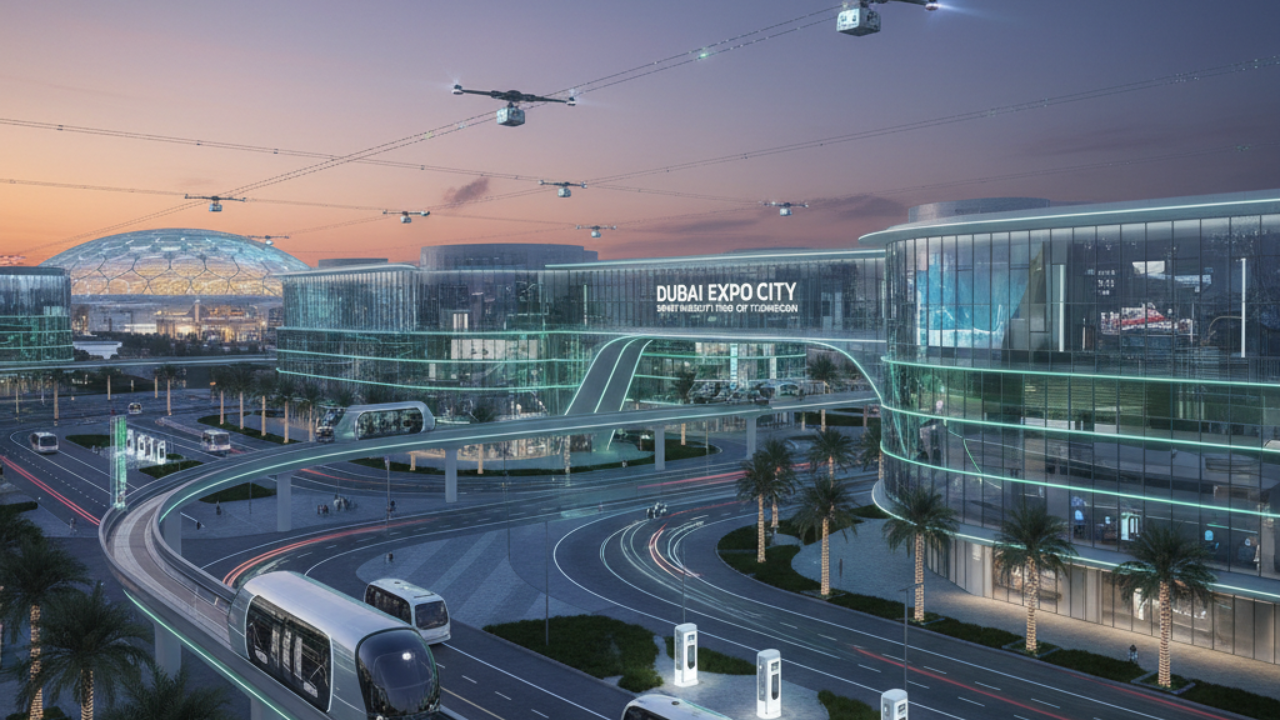
Post by : Meena Rani
Dubai Expo City is fast becoming a model for next-generation urban development. Built on the foundations of the iconic Expo 2020 site, it is more than a legacy project — it is a living demonstration of how cities of the future can move smarter, cleaner, and more efficiently. Combining electric vehicles, autonomous systems, and intelligent infrastructure, Expo City represents Dubai’s bold vision for sustainable urban transport.
Expo City Dubai is designed as a fully integrated smart city built around the concept of a 15-minute urban zone, where residents can access work, leisure, and services within short walking distances. Its mobility vision focuses on reducing traffic congestion, improving accessibility, and achieving near-zero emissions by 2050. As Dubai positions itself as a global hub for innovation, Expo City serves as a real-world testing ground for futuristic mobility solutions that blend technology with sustainability.
Expo City’s mobility hubs are strategically located to allow visitors and residents to rent electric scooters, bicycles, and wheelchairs with ease. These hubs act as micro transport stations connecting every corner of the city. This approach eliminates the dependency on private cars, reduces emissions, and ensures mobility for everyone — including seniors and people of determination.
Sustainability is at the heart of Expo City’s transport plan. The city features a wide network of electric vehicle charging stations integrated within its parking zones and public spaces. Dubai’s goal of having one in four vehicles electric by 2030 is reflected here, with smart charging hubs, EV taxis, and shared electric shuttles already part of the plan. The use of renewable energy in these systems reinforces Expo City’s eco-friendly commitment.
Expo City’s infrastructure has been built with autonomous mobility in mind. The city’s smart roads, equipped with sensors and AI-driven traffic management systems, are capable of supporting driverless cars and self-operating shuttles. Autonomous vehicles were successfully tested during Expo 2020, and these systems are now evolving to serve daily commuters and tourists. This integration reduces travel time, enhances safety, and makes mobility seamless for all users.
At the core of Expo City’s operations lies a connected network of data and technology. Smart sensors, AI algorithms, and Internet of Things (IoT) systems monitor every aspect of transport in real time — from energy consumption to vehicle flow. This data-driven ecosystem helps optimize traffic signals, manage demand, and ensure efficient energy use. The result is a responsive city that adapts dynamically to its residents’ mobility needs.
The smart mobility framework at Expo City delivers multiple benefits. It promotes sustainability by cutting emissions and reducing dependence on fossil fuels. It increases efficiency through data-led traffic control, reducing congestion and travel times. It improves inclusivity by offering accessible transport options for people with mobility challenges. And most importantly, it enhances the quality of life by making transport clean, quiet, and stress-free.
While the progress is remarkable, challenges remain. The large-scale adoption of autonomous vehicles requires regulatory clarity, safety frameworks, and public trust. Expanding EV infrastructure citywide involves significant investment. Integrating different transport modes into one seamless platform will take time and coordination. However, Dubai’s leadership and technological ecosystem give Expo City the foundation to overcome these challenges and set a global example.
Dubai Expo City is more than a sustainable district; it is a proof of concept for the future of mobility. Trending keywords like smart mobility Dubai, EV infrastructure, autonomous transport, and smart city innovation reflect growing global curiosity about how this model can be replicated elsewhere. By combining sustainability, inclusivity, and innovation, Expo City positions Dubai as a leader in next-gen urban planning and green mobility.
Expo City Dubai is not just building roads and charging points — it is redefining how cities move. With its intelligent design, electric and autonomous transportation, and commitment to sustainability, the city embodies the future of urban mobility. As global attention turns toward greener and smarter transport solutions, Dubai Expo City stands as a shining example of what tomorrow’s connected, sustainable cities will look like.
Disclaimer:
This article is written for informational and educational purposes only. It is based on publicly available data and research as of 2025. Developments and policies related to Expo City Dubai’s mobility plans may evolve over time. Readers are advised to refer to official updates for the latest information.
Dubai Expo City, Smart Mobility, Urban Transport, EV Infrastructure, Autonomous Vehicles, Smart City Dubai, Mobility Hub, Sustainable Transportation, Future of Transit










Advances in Aerospace Technology and Commercial Aviation Recovery
Insights into breakthrough aerospace technologies and commercial aviation’s recovery amid 2025 chall

Defense Modernization and Strategic Spending Trends
Explore key trends in global defense modernization and strategic military spending shaping 2025 secu

Tens of Thousands Protest in Serbia on Anniversary of Deadly Roof Collapse
Tens of thousands in Novi Sad mark a year since a deadly station roof collapse that killed 16, prote

Canada PM Carney Apologizes to Trump Over Controversial Reagan Anti-Tariff Ad
Canadian PM Mark Carney apologized to President Trump over an Ontario anti-tariff ad quoting Reagan,

The ad that stirred a hornets nest, and made Canadian PM Carney say sorry to Trump
Canadian PM Mark Carney apologizes to US President Trump after a tariff-related ad causes diplomatic

Bengaluru-Mumbai Superfast Train Approved After 30-Year Wait
Railways approves new superfast train connecting Bengaluru and Mumbai, ending a 30-year demand, easi